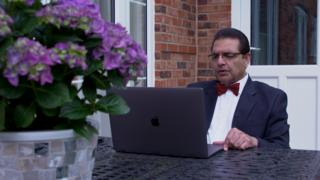Coronavirus: The British-Pakistani doctors saving lives in both countries

Dr Akhtar connects via video link from his home in Essex
From his laptop at his home just outside London, Dr Tahir Akhtar is helping treat a coronavirus patient in Lahore, Pakistan. Via a video link, a doctor there shows Dr Akhtar around the intensive care unit at the city’s Jinnah Hospital.
Dr Akhtar is an intensive care unit consultant in Britain’s National Health Service, and has helped lead the response to Covid-19 in Essex, where he lives.
Now, in his free time, he is using telemedicine software to share his experiences with counterparts in his country of birth, Pakistan – advising doctors on the best way to treat their patients.
“We are very proud of the NHS service we are giving here,” Dr Akhtar said. “And because of our relationships both in medicine and otherwise, it was very important for us to help our colleagues and to help the people of Pakistan.”
Dr Akhtar told the BBC the huge number of coronavirus cases meant that even in the UK it was not possible for intensive care doctors alone to treat seriously ill patients – doctors from different specialties also had to be drafted in. In Pakistan, the difficulties would be amplified, he said, making it useful for those doctors to have “someone they can talk to, someone they can take advice from”.
Dr Muhammad Ashraf Zia, who heads the Covid-19 ICU in Jinnah Hospital, told the BBC it was “very useful” to exchange ideas with Dr Akhtar – even though he is a senior doctor himself, as coronavirus is such a new disease. He said his team had begun using certain medicines to treat patients that they previously had not, and they were now producing “very good results”.
There have been about 250,000 coronavirus cases and 5,000 deaths recorded in Pakistan. That’s substantially lower than in Britain, where more than 44,000 people have died, even though it is likely fatalities in Pakistan have been undercounted.
However, Pakistan has far fewer doctors per capita than the UK, and at times hospitals there have been stretched. According to the World Health Organization, there are under 10 medical doctors per 10,000 of the population in Pakistan, about three times fewer than in the UK.
Dr Suhail Chughtai, another UK-based doctor of Pakistani origin, built the telemedicine software used to connect to the intensive care unit in Lahore. The software allows doctors to talk via video link and exchange copies of case notes as they speak. His aim was “to plug the gap” in Pakistan caused by a relative lack of intensive care specialists, by “importing” those doctors from the UK via telemedicine, he said.
Custom made software allows doctors to video chat and exchange files
Dr Chughtai has also created a number of other similar projects. One, run in conjunction with the government in Punjab province, allows doctors in the UK, Ireland, US and Pakistan to hold free virtual consultations with coronavirus patients – meaning they don’t need to risk travelling to a hospital or clinic and infecting others along the way. Doctors in the four countries have carried out 35,000 consultations since March, with members of the Association of Pakistani Physicians in the UK among those offering their services.
And another recently launched project aims to connect patients visiting rural health clinics in Punjab with centralised teams of doctors in more urban centres.
Dr Chughtai sees such schemes as the future of medicine. “Where a doctor and patient can speak the same language, we can create a bridge no matter where they are, through telemedicine,” he said.
There are other groups of British-Pakistani doctors also spending their free time trying to boost healthcare capacity in Pakistan. The “Midland Doctors” charity was set up in the aftermath of a devastating earthquake in Pakistani-administered Kashmir in 2005, and established a hospital in the city of Muzaffarabad.
Now, the charity’s members in Britain have been using their expertise to offer online training to doctors in Pakistan, as well as holding “virtual ward rounds” of critical care units, said one member, Dr Farhan Rashid. He said that because the UK’s coronavirus peak was well ahead of Pakistan’s, the doctors were able to offer valuable lessons to their counterparts in Pakistan.
Dr Chughtai, who founded a number of the telemedicine portals, said that many British-Pakistani doctors were keen to engage. “They love the UK, but they also want to give back to the country they came from,” he said.
from WordPress https://ift.tt/2OcW7ao



No comments